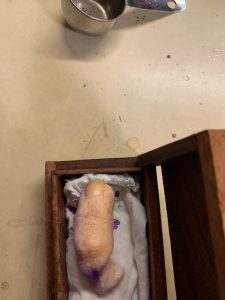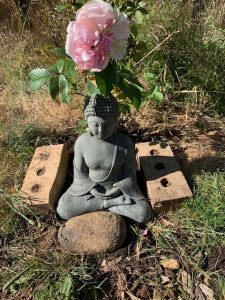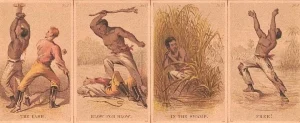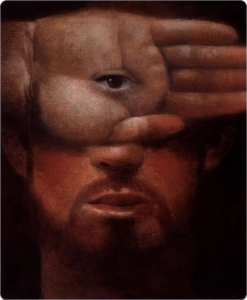[an article I wrote, originally published in Parabola Magazine]
We often speak of spiritual paths and journeys; of figurative mountains that must be climbed, as in Rene Daumal’s classic Mount Analogue. The spiritual path is an ascent fraught with rigors. The word path, in a spiritual context, indicates a definite course. It assumes the danger of getting lost, losing the path up one’s particular “Mount Analogue.” Our trek is in many ways an inward one, using outer indicators. For seekers, there are outer maps, and inner maps. And it’s possible to get stuck with an outer map that distorts our inner map.
In the days of the American frontier, trails to the west were sketchy. Information could be distorted by entrepreneurs wishing to sell goods to the pioneers. The distances were underestimated; the risks understated. Travelers on the Oregon Trail could be preyed on by bandits, and con men. Spiritual travelers have parallel risks.
There are many valid paths to the top of the mountain. There is Islamic mysticism, and Christian mysticism; there is Zen and there is Taoism; there are Vedantic traditions; there is the Fourth Way of Gurdjieff; there is Africa’s Ifa, and there are aboriginal traditions. There are many other paths that can take us to the yearned-for destination. But the same obstacles are presented along the way; some by outsiders, some by our own nature.
Perhaps the most recurrent cause of losing the way, is the risk of self-deception. One “cons” oneself. We insist that the shiny crystal we’ve found is a diamond. We’re hunting diamonds, of a sort; as in the Diamond Sutra, if you like. However…
Look there, a crystal glitters! A diamond! It is more likely mere quartz. No, I insist, it is a real diamond! I’m no fool! My own vanity is the first lure to draw me off the path, wherever my path to the top of the mountain may originate.
The outer world abounds with lures of all kinds. There are limitless roadside attractions on the path, featuring self-appointed “life coaches”, and would-be gurus with poorly understood meditation techniques. There are venal channelers, personality enumerators, persons of high charisma and low morals — and worse. There is also our desire to see egoic selves in the world; to find mirrors that seem to draw us to gaze adoringly into them; mirrors that draw us off the path, so we can keep preening in the looking glass…
So many distractions — and many of them are there right at the very beginning of our journey, when the only surety we have, at first, is an unusual wish — a wish to know why we’re here; to know how we can have a more fulfilled life; to know if God exists, and if inner freedom is possible.
It is possible to go a long way on a real path, only to stumble off into the wilderness. I know of spiritual teachers who started out as insightful and kindly and who even developed siddhis powers, only to be seduced and destroyed by their own vanity; who wandered blindly after that retreating mirror, towing others with them in the slipstream of their glamor.
How to find one’s way past all this? What’s the best way to separate the wheat from the chaff?
There is skepticism. According to B. Alan Wallace, author of Meditations of a Buddhist Skeptic, “The Buddha himself embraced the value of skepticism, for he counseled others not to adopt beliefs on the basis of hearsay, legend, tradition, scriptural sources, logical conjecture, probability, or a teacher’s authority. He encouraged us to learn through our own experience which theories and practices are wholesome and which are unwholesome.” Wallace points out that “the Greek term skeptikoi means seekers or inquirers.”
But skepticism alone has been known to shoot itself in the foot. Some skeptics doubted the germ theory of Pasteur; some people are mistakenly skeptical of vaccines, even now. Back in the day, skeptics said we would never fly, and never reach the moon. Skepticism per se is too broad a term for our needs, evoking pictures of people snorting and rolling their eyes. Rather unfairly, the term has taken on a tang of negativity. Let us then engage a more thoughtful form of lively inquiry, critical thinking. I would argue that critical thinking is a necessary tool to bring to any spiritual search. And it is a tool with two points; one is aimed outward, one is aimed inward.
Critical thinking underlies the scientific method. I have a friend whose writings in spirituality I value highly; he’s grown angry with science, and never misses a chance to denounce it. But ironically, a scientific attitude can profoundly enhance a spiritual path. Those who want to include science in spirituality can point to subatomic physics and its breaking down of all things into wave-forms, and to quantum physics phenomena like “spooky action at a distance.” Our appreciation of these phenomena is complicated by opportunists who reference those discoveries to promote quackery and cults. “Just three hundred dollars for my quantum-energy youth-restoring bracelet!” Still, real scientists, like the physics-mathematician Roger Penrose, proffer intriguing theories on the sublime nature of consciousness. The Dalai Lama has a deep interest in science, and has cooperated in experiments. Gurdjieff said, “I ask you to believe nothing that you cannot verify for yourself.” So don’t kick science out of bed.
But can we test our spiritual experiences, as scientists test out their theorems?
I maintain that we can. Although with a deep spiritual search, we must couple critical thinking with another kind of tool, the lens of attention itself, and its application to gnosis.
Socrates offered “the disciplined practice of thoughtful questioning” to determine the validity of an idea. That’s basic to critical thinking. First, critical thinking asks, are we subject to some front-loaded preconception? To get at the truth we must be unbiased toward a positive or negative conclusion. We don’t assume that every shiny crystal is a diamond, and we don’t assume that a rough piece of crystal is not a diamond. But we consider what could bias us into thinking a bit of quartz is something it’s not. We recall the man who advised us that diamonds could be found on this hillside, and he charged fifty dollars for the information. We wanted to find diamonds badly enough we were willing to pay, and no one likes to disappointed, nor admit to gullibility. Thus there is indeed reason to suspect we have some bias toward believing that these objects are, dammit, real diamonds. Then we consider whether the data leading one here could be corrupted. Logically, if a man is charging to direct us to diamonds, he needs money. If he needs money, why can’t he dig the diamonds out himself? The more we pause and think about it, the more we see the illogicality of his claims.
If we’re thinking about pursuing a certain path, critical thinking suggests we research it outside the parameters offered by its proponents. Has anyone associated with it been accused of fraud, of deception, in the past? Are there well-substantiated, or even frequent reports of predatory behavior, or malfeasance?
Certainly, this due diligence to some degree slows down our approach to spirituality. But the truth about why we’re here, who we are, and the meaning of life, is more important than the excitement of rushing into something. It’s a serious matter and it needs serious research. What, after all, is more important? The flashy outward reports of a guru levitating — or that person’s insights and practices? If we don’t apply critical thinking, we’re liable to lose far more time getting diverted onto a long road that leads only to a dead end.
But the great obstacle to a seeker of truth, is myself. We’re biased to believe — it’s so much more exciting than the alternative — and that can lead us to blindly follow some charlatan. Fears, too, make us vulnerable to losing our way, like the fear of death; some doctrine promises immortality; caught up in fear, we take it up without really thinking it through. If we’re insecure, we may lean into believing whatever a flatterer tells us. If we’re prone to seeking attention, we may choose to interpret life’s ordinary patterns in a way that makes us feel we’re the Chosen One. Critical thinking employed on a spiritual path involves awareness of our own psychological vulnerabilities. We all need to borrow Diogenes’ lamp, and look at ourselves with it.
There are obvious applications of critical thinking in spirituality, and there are less obvious. Once we’re on a real path, the less obvious application of scientific method is the most vital. The late Jacob Needleman, in his short but powerful book What is God? speaks of two sides of empiricism. On one side, “all knowledge must be rooted and tested by actual observation and objections in the external world.” But, he points out, the doctrine overlooks “the existence of the discipline of inner experience, experience of the inner world that is precise and undeniable as the facts brought to light by sensory experience of the external world…” He points us to an “inner empiricism”, accessed through “pure attention”.
Inner empiricism involves bringing two forces to bear to produce a third force. Thesis, antithesis, synthesis. We learn how to meditate from a real expert; we learn how to engage in mindfulness, and then deep mindfulness; we learn how to open up to what we see, within our body and our mind and our spirit, revealing a picture of a possible truth about the higher reality. That’s thesis. Then we test it, with real objectivity, being a bit–dare I say skeptical? — about what we’re taking in. We use our “taste for things that are true” as Henri Tracol put it. We expose it to pure attention, from the vantage of non-identification. That’s antithesis. We then welcome in what is unquestionably real, what is undeniable. And that is synthesis.
An important aspect of the scientific method is peer review. In esoteric traditions, there are often groups that meet to discuss their experiences. They work together to vet each other’s experiences. Together they separate imagination from real experience, vanity from progress. Seeking out peer review from really trustworthy peers is a great way to keep from getting lost along the Way.
Another means of staying true to a spiritual work is a discipline found in Buddhism, Christian mysticism, and in the Fourth Way: self-observation. Learning to see ourselves through the basic method of separating some attention for objective self-observation clears away the fog, shows us where we’re going wrong, and sets us right again.
Eventually these purification processes become second-nature. We’re still digging for diamonds, in a way. But the right hand is doing the digging, the left hand is rubbing away the coating of soil to see the stone more clearly. And — having researched what real diamonds are like — we subject the stone to the pure light which tells us if it’s a real diamond.
Along the Way, we have spiritual experiences — or are they? Some may be realer than others. We’re prone to imagination, after all. Everyone is. We want to believe; we know that too. To be free of these tendencies, we have to consciously set aside eagerness to believe, and all presumption, and rely instead on pure attention to reveal the experience as real, or a distortion of imagination. If we find that it was all about our desire, and our imagination, we don’t take it personally, anymore than we do if we’re on a long freeway drive and we see that the offramp isn’t the one we’d hoped it was. We simply keep to our course.
As J. Krishnamurti says, we try to “free the mind from all conditioning” to see “the totality of it without thought.” He directs us to pure observation “without any shadow of the past, or of time.”
What may start as uncertainty, becomes questioning, a process of sorting-through, to find the essential; of cleaning the lens of fingerprints and dust, so that light passes through at its purest.

 A bunion had crushed the second toe and rather than go through the pain and time off my feet to have it reconstructed I opted to have it removed. We asked for it to take it home, permission was given, and it’s been buried in the yard. All this is true. Micky’s idea. There will be photos. She put a Buddha statuette over it and I wrote this:
A bunion had crushed the second toe and rather than go through the pain and time off my feet to have it reconstructed I opted to have it removed. We asked for it to take it home, permission was given, and it’s been buried in the yard. All this is true. Micky’s idea. There will be photos. She put a Buddha statuette over it and I wrote this:  …we may need to turn to Lincoln’s Second Inaugural Address, when we have Triumphed.
…we may need to turn to Lincoln’s Second Inaugural Address, when we have Triumphed. 